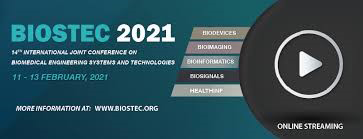Por Tiago Guerreiro.
The purpose of BIOSTEC is to bring together researchers and practitioners, including engineers, biologists, health professionals and informatics/computer scientists, interested in both theoretical advances and applications of information systems, artificial intelligence, signal processing, electronics and other engineering tools in knowledge areas related to biology and medicine. BIOSTEC is composed of five co-located conferences, each specialized in a different knowledge area.

Abstract: The advances in computing and sensing technologies, along with the capabilities to process and infer information from them, have not been accompanied by similar-paced developments on end-user tools. Scientific databases are filled with new possibilities for monitoring and predicting diseases, but clinicians (and patients) see slow and poor advances in what is provided for their practice and daily lives. In this talk, I will present the research we have been doing embedded in a clinical environment, co-designing usable technologies for immediate benefit, and to inform our next research steps. Alongside this, I will argue that this user-centered multidisciplinary effort makes both parts (technology and clinical) more equipped to discuss new designs and move research forward in a way that is grounded on experience. Lastly, I will present what we have learned from empowering clinicians with the tools to author their own data collection procedures, towards the democratization of digital healthcare.
Biography: Tiago Guerreiro is an Assistant Professor at Faculdade de Ciências, Universidade de Lisboa, and a senior researcher at LASIGE. His main areas of expertise are Human-Computer Interaction, Interaction Design for Healthcare, and Accessible Computing. His research is focused on improving health and accessibility through technology, following a user- and data-driven approach, pillared by deploying and assessing technological artifacts in-the-wild. In these areas, he has published 75+ peer-reviewed papers. He received awards for 10+ papers, including at CHI, ASSETS, and MHCI, and an ACM Best of Computing award in 2016. He was the ASSETS 2020 General Chair, Web for All General and Program Chair, in 2016 and 2015, respectively, was Chair of the “Accessibility & Aging” Subcommittee for CHI 2019, among many other service roles. He is ACM Transactions on Accessible Computing Editor-in-Chief. He participated in 10+ EU projects (including an ongoing IMI project on digital endpoints for PD). He was an expert evaluator for H2020 EU PHC, EIT Health, CMU Portugal, and ERA ICPermed calls and was an invited expert supporting the European Commission in implementing the Web Accessibility Directive. He is the chair of Ciências's Ethics Review Board, the coordinator of LASIGE’s research line on Accessibility and Aging, and a member of the coordination board of the Data Science Master at Ciências.











